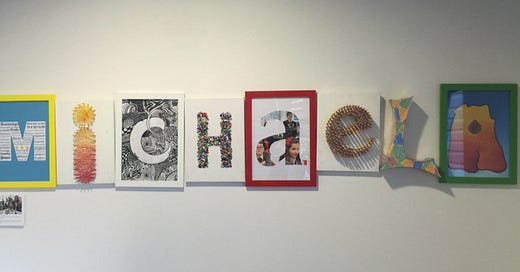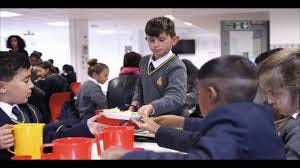This is a blog post I wrote in 2016, about a visit to Michaela Community School in Wembley, London. The reason I’m reposting it here is that it still seems so relevant today. Since I wrote it, MCS is now the top performing school in the UK by progress, and has been ranked Outstanding by the UK school inspectorate Ofsted, including its provision for children with additional needs. So you’d think that its critics would by now have just packed it in and admitted that their fears were unfounded. ‘Gee, I guess we got it wrong. Hooray for all those kids with massively improved life chances!’
If only. To do so would be to admit that their efforts, energy and time had been invested in destroying something that actually helped children, and that their own endeavours had been devoted to making things worse. And that is unbearable to them, who see themselves as guardians and protectors of innocents. So it becomes impossible to pull back from the brink of the abyss of their own actions. The view is simply unbearable, because it is a reflection of their worst fears, and its wearing their face.
So I’m reposting this as an act of public service, to remind people that Michaela has been fighting the very best of fights for a very, very long time, and often against people who claim to be invested in the wellbeing of children and their outcomes, particularly children from disadvantaged circumstances. Meanwhile, Katherine Birbalsingh and her team remain dedicated to their making a perceptible, tangible difference, rather than carping from the sofa of social media or newspaper columns. In this particular debate, I know which side I think does the most good.
A couple of days ago I was chatting to a builder friend. He had a client who worried him. ‘Thinks that people are breaking into his house and moving things,’ he told me. ‘Showed me a tiny crack under the stairs. ‘That was them,’ he told me. ‘They drilled into that.’ But when I said that no drill could reach down there, he said, ‘Ah but they got special drills.’ When I asks them how they got into the house, he said, ‘They’ve got a master key.’’ And so on and so on. This guy never left the house, and no matter how you disputed his theories, he always had an answer. His beliefs were evidence proof. Nothing you could say would change his mind, and any evidence for against the premise would be enlisted as further proof.
Which brings me nicely to the Michaela Community School in Wembley, where I spent a day this week once again boggling at their systems, their kids, and its buccaneer warlord, Katherine Birbalsingh, who makes Javert seem weak willed and forgiving. The title of this blog post, according to some, should be 'Joyless child factory crushes dreams like tin cans.' Michaela School is so famous that it even manages to grind the gears of people who haven’t heard of it. Birbalsingh, is feted and berated by different constituencies; she is the avatar of a style that has some people hooting and genuflecting like acolytes, and others reaching for their epi-pens and biting hard on their bridles. The motto on the poster outside is ‘Knowledge is Power.’ Uniforms and rules are enforced like a divine liturgy. You know where you are with Michaela. There is little chance you would mistake it for Summerhill.
But it’s a school of surprises. Michaela was named, not after a character from a Dickens novel, but after a teacher from St Lucia, who died of cancer and 2011. Her example so inspired Birbalsingh, that she ‘wanted to see Michaela’s name on every blazer.’
Jars of children's tears
The behaviour is extraordinary, and I’ve seen a lot of schools to calibrate that opinion. Every class I visited worked monkishly as the teacher led the activities; pupils tracked the teacher carefully; they started work promptly and with gusto; they glided from room to room as quietly as canoes on a current. Put it like that you can hear people grinding axes already, and racing for their quills so they can draft open letters. Surely demanding silent acquiescence is an act of tyranny to the natural state of the child, they say, which should default to lively, jocular and demonstrative.
A teacher at Michaela, crushing another child's dreams
To be sure, the extraordinary contrast the school presents to most of its peers is indeed initially quite alienating. ‘This is too strict’ you think, as children file in one column between lessons and into class. But the transitions, my God. One lesson ends, and another begins, in about 2 minutes, max, from packing away to pen on the next task. The whole school, over four floors. There are synchronised swimming teams that couldn’t match that. The goal is to maximise the learning time; the rationale is that children in private schools have advantages they never will, but one thing they have is a Spartan approach to learning. Work hard, never give up, practice.
One common complaint you often hear from people who have never visited the school (but still have very strong opinions about it) is that this kind of regime crushes enthusiasm, curbs the love of learning, and reduces education to a giant quiz. But every child I spoke to, from lesson to lesson told me how much they loved it. When I asked them what their previous schools were like, the were unanimous. ‘Alright,’ said one girl,’ But it was really noisy and there was too much mucking about to get much done. Here we learn loads and the teachers really care about us.’
Don't Care Bears
Care? This is a strange word to hear in a school where children are galley slaves to rote learning, or so Cassandras would prefer to believe. It might suit people who disagree with its philosophy to demonise its exponents, but the truth refutes the easy slur. There’s a whole section in the school training manual on kindness. The school motto on the outside is ‘Knowledge is power’ might make opponents clutch their pearls, but the real school motto is ‘Work hard, be kind,’ something you see sign posted a lot inside the building.
‘If we mess about then we’re being selfish to other people,’ said one of my guides, which was echoed by another boy I spoke to at lunch, and others. They were all explicitly concerned that being civil to others was an act of community, both intrinsically and instrumentally valuable.
Children were 'forced to be kind to one another'
Ah, lunch; now there’s something that has to be seen to be believed. Lunch (or family lunch as they call it here) is like nothing you’ll have experienced before outside of the SAS. Children enter at 12:30 (on the dot of course) and- and this is where you feel the medication start to kick in- are led by a teacher in a poetry battle chant as everyone files in. You have to be there to experience 120 children all howling Kipling’s ‘If’ or Henley’s ‘Invictus’ and absolutely nailing every line. Some critics claim memorising poetry is crude and utilitarian, take it up with Benjamin Zephaniah, who is in no doubt: memorising texts is essential to understanding them in action.
Once you drop down this rabbit hole, you don’t get out. Pupils sit in groups, at tables named after universities. Each pupil at the table has a role: hand out water, serve food, collect plates…one of them is even designated to talk to guests (‘Can you tell me more about what a Tsar does please?’) and it’s terribly civil. There’s a topic of the day and each table sticks to it pretty well. Service is communal, and runs to the clock like they’re defusing a bomb. Food is vegetarian and halal so everyone can eat together. If Navy Seals ran a langar it would be like this.
Then it’s back to silence and suddenly pupils and staff are asked to give thanks to people in their lives in short dedications (‘appreciations’), which is quite something. ‘I’d like to thank my mother for helping me cope with the weekend. On the count of three….’ and everyone claps twice, neatly, simultaneously. Then onto the next one. Students were straining their arms in the air to be picked to do this, across the whole dining room. Then, like a Busby Berkely musical, the cohort streams out and the next one lands, and the process reboots. It is a far cry from an average lunch where, according to one of my old dinner lady colleagues, ‘the kids catch up with who fancies who in between telling us our food is shit.’
Lessons are intense. The students have all been habituated in how to behave in such microscopic detail that each room feels like a Holiday Inn: every one feels like the last. This is deliberate. The norms that permeate the school are reinforced in every circumstance. In many schools you see different rules for different rooms, and zones, and teachers; here, there is a calm understanding that there is a school culture, commonly understood.
Why so serious? Challenge. The more civil the behaviour, the greater the focus, the more they learn. I never forget attending an INSTED on gifted children and asking how to implement their lovely ideas in a challenging class. ‘Oh, you can’t do this kind of stuff if the class is noisy or challenging,’ I was told. Of course not. If you’re firefighting all the time, not only do you lose time, but if you can’t rely on all students to behave to a certain degree, your palette of activity options is reduced, and your lesson is diminished, length and breadth. The point of good behaviour isn’t to build robots; the point of good behaviour is to do beautiful, wonderful things in the classroom, to expose children to challenge and possibilities they would never encounter otherwise.
And that’s what I saw here. The difficulty setting was high. The school writes its own textbooks, on the grounds that many textbooks are stuffed with patronising, time-wasting infantilising material (and I’d agree incidentally). No pictures or wacky cut’n’paste activities here. In fact, not a glue stick anywhere, as they decided what the hell did gluing something into a book have to do with learning anyway? Instead I saw exercise book after exercise book bulging with fulsome paragraphs and detail. Book after book after book. Even children with learning difficulties showed great progress. The philosophy, I was told, was to focus on what they were capable of, not their incapability; to appreciate the learning need but not to fixate on it as a maximum. I have no problem with that.
It’s a small school, and scaling up is their short, mid and long term challenge. The curious thing is that it gets torn apart by commentators, most of whom, i can only presume, have never been to the school, spoken to the children or seen the impact their extraordinary approach to rigour and following through creates.
The proposed new site
I left, as I have before, impressed. The kids are happy, and totally loyal to the school. Parents for the most part love it. Every staff member is so down with the ethos I wouldn’t be surprised if they all had tattoos (or micro chips in their neck). There’s even a member of staff who left teaching but returned to the profession to work there. The achievements of the kids- measured in book work, attitude, behaviour, enthusiasm and engagement (yeah I said it) is remarkable. Critics of the school have to process and explain away these facts before they can ride off on high horses.
Would I want every school to copy Michaela? No, of course not- they have to find their own way. It’s not to everyone’s tastes, and many prefer schools to be a little more groovy and chilled out. And that’s fine too, if that; what you want for your kids. I value plurality in our system, and nature demonstrates that mutations are often desirable for a species’ success. Michaela has caused a stir because, I think, it confronts many people’s preconceptions about what is possible with inner city kids. But it would be a shame to bash a school because it wasn’t the same as every other one.
I wish it well. And I wish more people would go to Michalea to see what the fuss is about before they join in with the Twitchforks and synthetic outrage.







